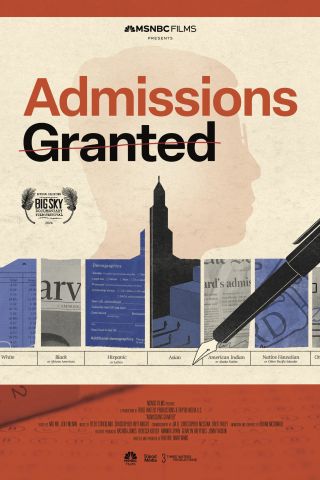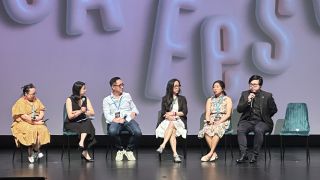Media
“Admissions Granted”: AAPI Responses to Affirmative Action
Personal Perspective: What do Asian Americans think of affirmative action?
Updated May 10, 2024 Reviewed by Ray Parker

Admissions Granted, from award-winning directors Hao Wu and Miao Wang, is an important look at Asian American struggles on both sides of affirmative action. The film will premiere on MSNBC on June 30, 2024, but is making a festival run now. I saw it yesterday on the opening night of CAAMFest, the Asian American film festival in San Francisco, and I highly recommend it to all. The attached picture of the post-film discussion is apt: there is an empty chair, prompting me to ask, “Who is missing, and who is devalued, in this discussion?” Some would say Asian Americans have been missing, but how are we “showing up” now? What is motivating us? What voices are we dismissing as we formulate our outlooks? For example, research indicates that with every 10% increase in Black doctors in a county, life expectancy for Blacks goes up by 30 days. Doesn't then closing down the pipeline for Black doctors produce earlier deaths for Black patients?

The vast majority of Asian Americans support affirmative action. This support varies by ethnic group, from 45% (Chinese) to 60% (Indian), according to the Pew Research Center, or 59% (Chinese) to 80% and 82% (Indian and Korean), according to AAPI Data. However, the resentment, disappointment, frustration, ambition, and experiences of racism of many Asian Americans are real, and that, unfortunately, seems to have been coopted into the resentments of many in the dominant white majority culture, producing further problems for many Black, Latinx, and Indigenous communities. After California banned race-conscious affirmative action in 1996, Black and Latinx enrollment in the University of California (UC) system dropped dramatically. It is unclear what will happen this year, the first admissions cycle after the U.S. Supreme Court's Students for Fair Admission (SFFA) v. President and Fellows of Harvard College overturned affirmative action in a 6-3 decision in June 2023. This vacated decades of precedent and wreaked havoc with both public and private college admissions. The primary standing argument for affirmative action was that diversity is good for all. However, this ignored other arguments, such as racial reparations and economic justice.
While some of the Asian American youth who were recruited by controversial legal strategist Edward Blum for SFFA now report that they want a system that produces equity without discrimination against Asian Americans or others, Blum is taking his fight to DEI (Diversity, Equity, and Inclusion) programs in business, government, and education. He says in the film that he doesn’t believe structural racism exists in America, a line which drew derisive laughter from the audience at CAAMFest. We know differently. Blum began his legal exploits after losing a congressional race in Texas. He successfully fought to overturn the Texas congressional map, which accounted for race, to boost the representation of minorities in the legislature.
Blum seems a prime example of what I call “the basic split.” We all arise from vulnerability and precarity in our human condition. From this vulnerability, we can either try to achieve selfish and factional power over others and get what we want in the short run, or we can stay close to vulnerability and suffering and build compassion, relationships, and belonging to achieve a greater good for the long-term. We can become a “guard tower” of contempt and criticism of vulnerable populations and their perspectives, or we can become a beacon of hope for all. I think we all carry elements of this split intrapsychically, but it is very visible in our interpersonal, social, cultural, and political environments. Blum seems very much a sentinel of the guard towers of the dominant and dominating culture.
There are underlying mental and social health questions that do not get addressed in the adversarial legal system that overturned affirmative action. Questions like: “What do I do when I don’t get what I want? When I am disappointed? How do I deal with resentment, disappointment, social comparison, self-esteem, and self-worth? How do I deal with self-centeredness vs. the greater good?” These questions fall on the myths of the American dream and meritocracy, that we should all be able to get what we want, that people do and should rise based on supposedly objective criteria, and that we are all inevitably pitted against each other in a zero-sum game.
Certainly, achieving our goals is a key component of happiness. However, research has clearly indicated that the warmth of relationships matters most. “Happiness is love. Full stop!” said psychiatrist George Vaillant of the Grant Study. I actually tell my patients that my definition of happiness is greater confidence and capacity to deal with distress. And that comes from working with the inner life to develop wisdom, and also a deeper relationship to trusted others. As Harvard graduate and proponent of affirmative action Sally Chen said of her aspirations in the discussion (I paraphrase), “solidarity with other communities affected by racism.” We can’t get to belonging without compassion and solidarity with the most vulnerable among us. We can’t get to a better world by creating obstacles for those who are already burdened by racism, sexism, homophobia, and the like.
When I got into Brown University, a white student at my high school who did not get into an Ivy League institution barked at me in his pain, “You only got in because of affirmative action.” He later apologized, and I forgave him. I actually even said, “I don’t know why I got in and you didn’t. Maybe it was affirmative action.” I later came to believe that affirmative action did indeed play a role, and I proudly declare myself a product of affirmative action. Of course, my fellow Asian American students at Brown in the mid-80s complained that there seemed to be a cap then on Asian American enrollment. Our protests, along with the voices of other Black, Indigenous, and people of color (BIPOC) students, produced change and a better campus after a blue ribbon committee. Brown later also produced a seminal report on the role of slavery in the university’s foundations and founding families.
We need more consciousness like this, not less. Blum and the opponents of affirmative action have had their day, and they and others like them seem to want to shut off nuanced debate. I was startled and infuriated by the lack of understanding and nuance in the majority opinions in the affirmative action case. (See references for my writings on the subject.)
I can only hope we can collectively develop greater capacity and confidence in dealing with the immense disparities and inequities in American life.
Admissions Granted illuminates the challenges of Asian American, and indeed American, community. Will we fulfill E Pluribus Unum, or will we fall apart? Are we of, for, and by all the people, or just the wealthy elite? Will we overcome the legacy of racism or perpetuate it?
It’s on our plate, and it will be on the ballot in November.
© 2024 Ravi Chandra, M.D., D.F.A.P.A.
References
Chandra R. MOSF 18.5 Affirmative Action: SCOTUS and the Dominant Culture Tell on Themselves (Part 1). East Wind eZine, July 1, 2023
Chandra R. MOSF 18.6 Affirmative Action: SCOTUS and the Dominant Culture Tell on Themselves (Part 2). East Wind eZine, July 13, 2023
Chandra R, Dunlap CE. SCOTUS Deals a Blow to American Diversity by Overturning Affirmative Action. Psychiatric News, published online July 14, 2023
Boyle P. Do Black patients fare better with Black doctors? AAMC News, June 8, 2023
Asian Americans Hold Mixed Views Around Affirmative Action. Pew Research Center, June 8, 2023
69% of Asian American Registered Voters Support Affirmative Action. AAPI Data, August 2, 2022




